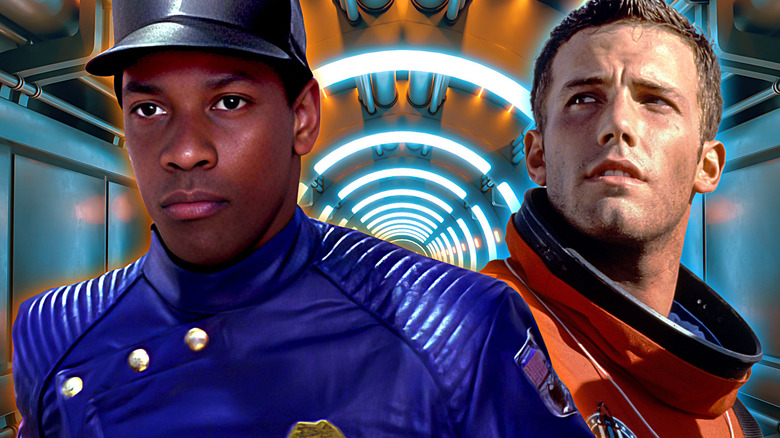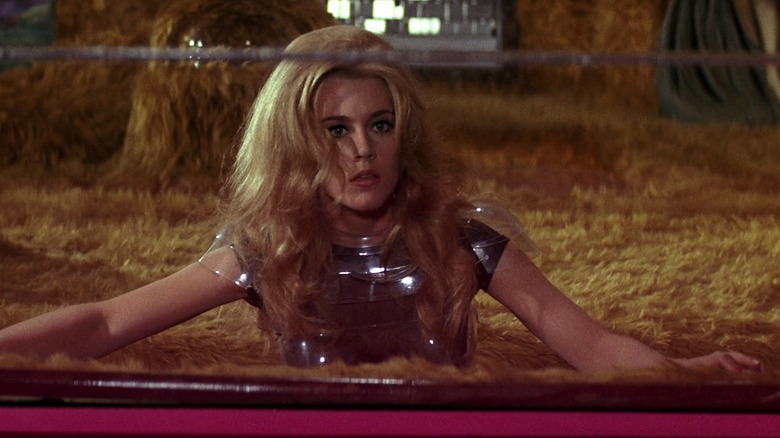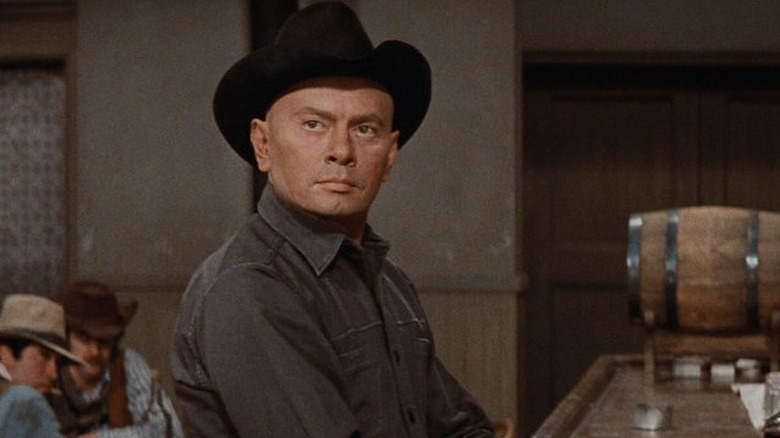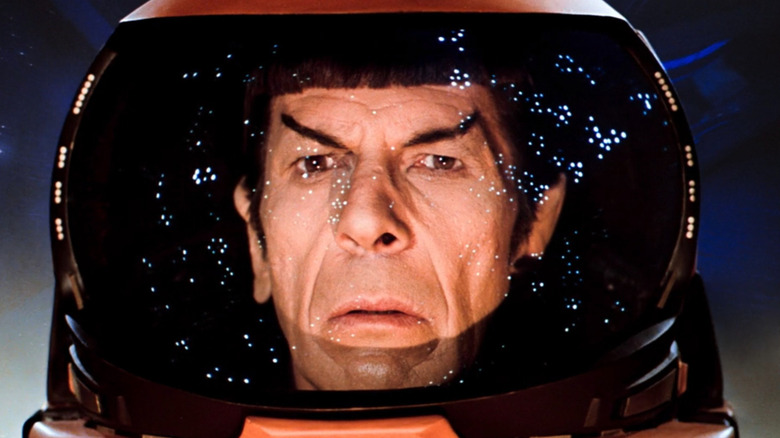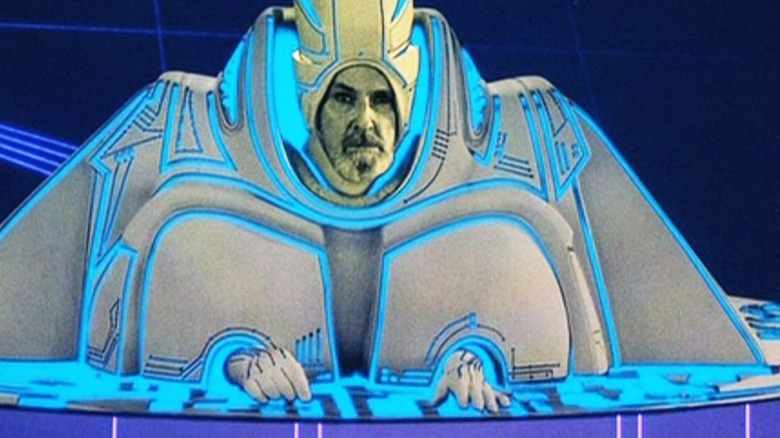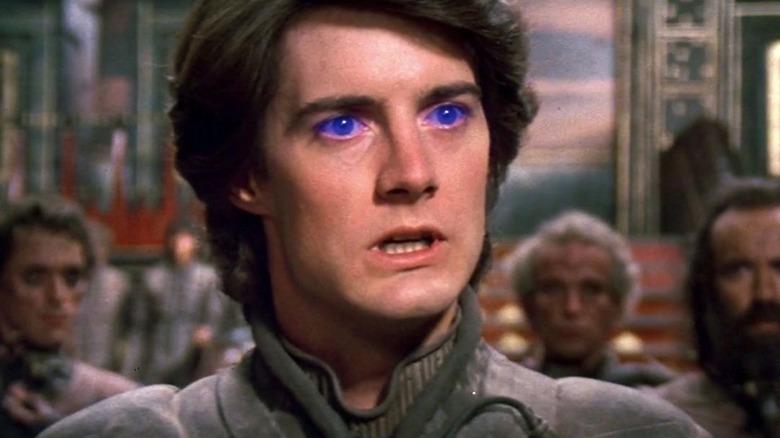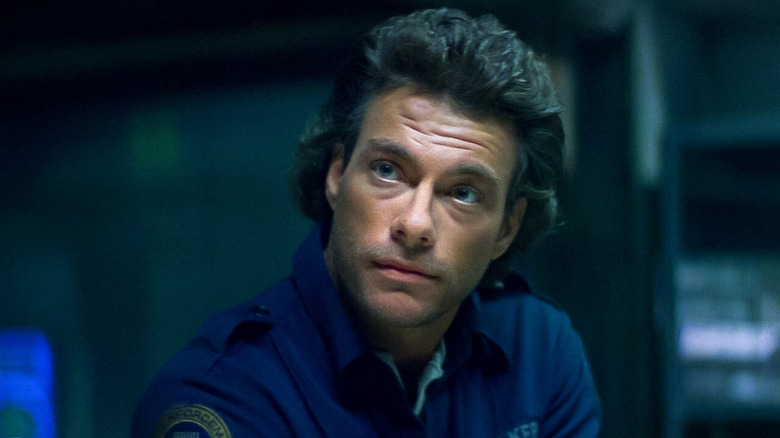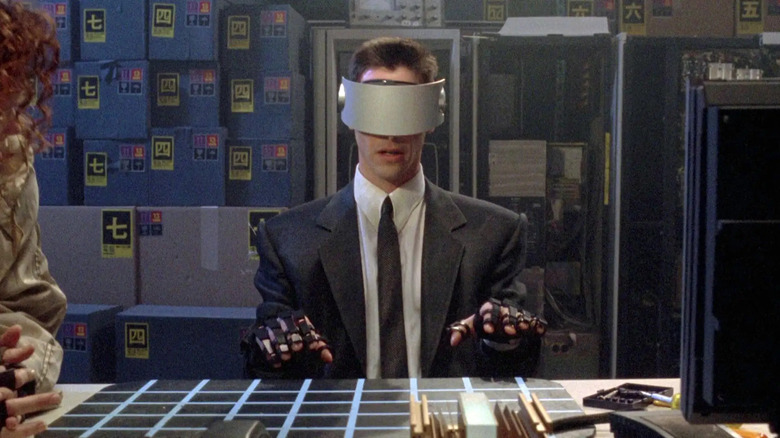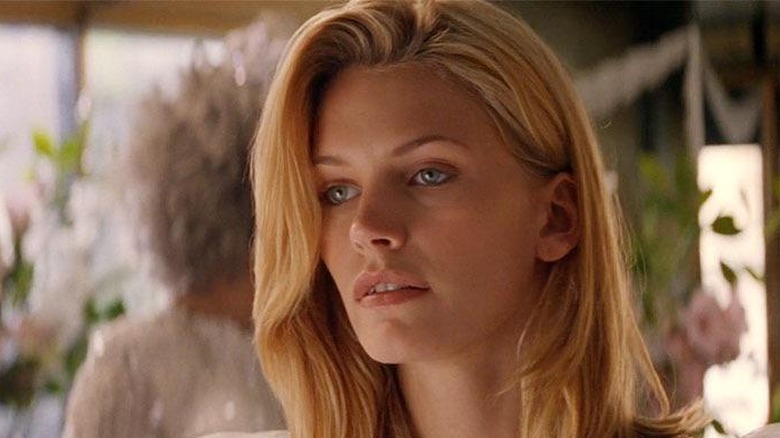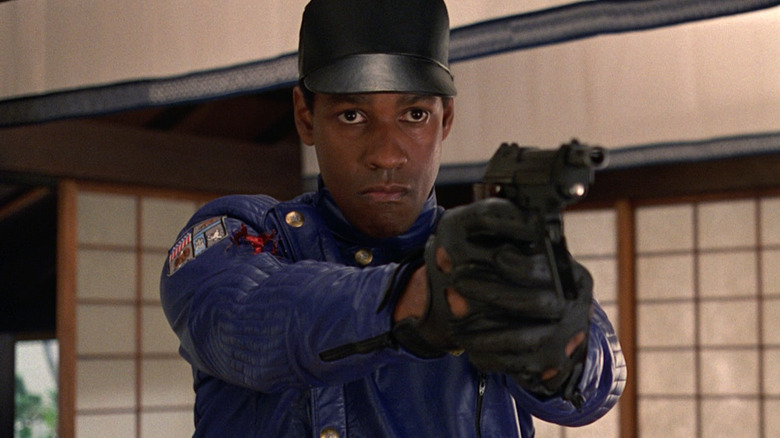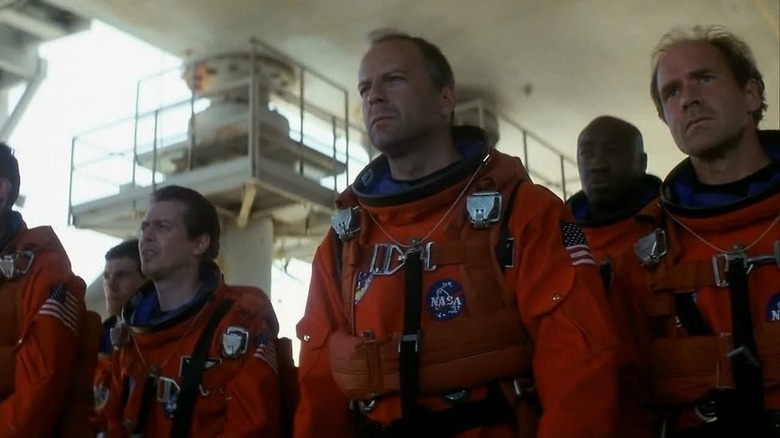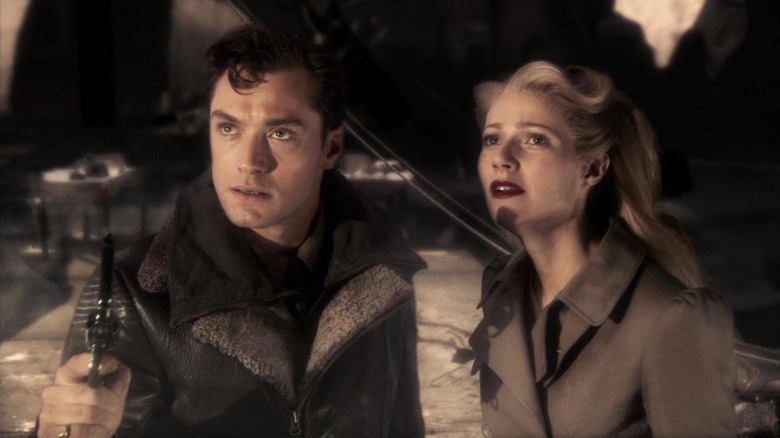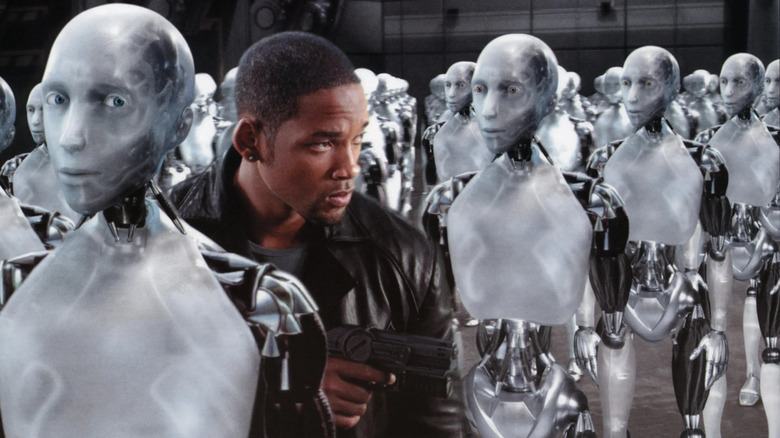Sci-Fi Movies That Became Unwatchable With Age
There are a number of timeless sci-fi classics, from the pioneering "Metropolis" to the space adventure of "Star Wars." But not all movies stand the test of time. For every "Back to the Future" that continues to delight audiences more than 30 years after its first release, there is a film that has become difficult to endure today even when we loved it at the time.
Those sci-fi favorites haven't aged well for a variety of reasons. Some, perhaps predictably, suffer from badly aged special effects, while others might be built on concepts that don't really make much sense decades later. A few might even have become cringe-worthy due to poor scripts or bad production design that we only noticed after years of hindsight allowed us to separate the spectacle from the story. Did you once love one of these movies, but now find it difficult to watch all the way through? You might be surprised at what sci-fi classics make our list of movies that have become unwatchable with age.
Barbarella (1968)
Four years before she took home an Academy Award, Jane Fonda starred in the Italian sci-fi classic "Barbarella." The pulp-inspired space-age adventure saw Fonda playing the eponymous Barbarella, a space vixen on a mission to track down a scientist who has created a devastating weapon. The film never attempted to be much more than schlock, with a sense of humor about the ridiculousness of the proceedings, but that didn't stop it from earning a healthy following in the ensuing years, especially after Fonda became a huge star.
"Barbarella" was never designed to be taken too seriously, and nobody ever had any illusions that the guilty-pleasure sci-fi movie was very good, but fans found fun in its over-the-top, stylized sci-fi and appreciate how it embraces its limitations. But what its biggest fans like about it is also why it's nearly unwatchable today: The plot feels slapped together as if written in a weekend and the sets, props, and costumes look just as quickly assembled. Though some may be able to find charm in such silliness, the story is essentially the same plot beats repeated over and over as Barbarella finds herself in a tough situation, fights her way out, and caps it off with a love scene. And that's the problem: when viewed with the benefit of nearly 60 years' hindsight, the movie is so incredibly sexist it's hard not to wince at it.
Westworld (1973)
Released in 1973, "Westworld" was written and directed by Michael Crichton, the late author who is today best-known for his novel "Jurassic Park" and for creating the hit medical drama "ER." It tells the story of a futuristic theme park that allows guests to live out their greatest fantasies in a series of lifelike recreations of historical periods populated by androids.
Receiving good reviews for its explorations of the dangers of artificial intelligence and its gripping story of a theme park gone haywire, "Westworld" was a big hit for MGM and a fan favorite for decades. Although the technology in the film, not to mention the special effects, are horribly dated today, the film generally still works. The problem, however, is that in 2016, "Westworld" became a critically acclaimed sci-fi thriller series on HBO, reimagined by producers J.J. Abrams and Jonathan Nolan. The reboot, with an updated take on the story of robots going rogue — augmented by cutting-edge VFX — outstripped the original film so spectacularly that modern audiences may find the original film difficult to watch.
Slower, less action-oriented, and clearly out of step with today's technology, the movie can be difficult to watch all the way through if you're more familiar with the HBO series. With some hammy acting and outdated effects, "Westworld" can come across as somewhat goofy, almost childish by comparison. If you're a fan of older movies, particularly more talky sci-fi (or weird Westerns) of the 1970s, you may still enjoy it, but anyone else is going to struggle to make it through.
Star Trek: The Motion Picture (1979)
"Star Trek" has seen multiple hit TV shows, often lauded as the best sci-fi franchise ever. But at the movies, the iconic series hasn't always been at its best, with fans pointing to the "even/odd" rule that suggests the even-numbered films in the series are the only good ones. Whether that notion holds up today is one of the most debated questions among fans but most will agree that it was "Star Trek: The Motion Picture" that got the theory started.
Released in 1979 and produced to capitalize on the success of "Star Wars," the film brought the entire cast of the original 1966 "Star Trek" series to the big screen in a feature-length adventure. But unlike the fast-paced space action that made George Lucas' 1977 epic such a phenomenon, "The Motion Picture" is a slow-moving, cerebral, and sometimes boring story with little to keep fans' eyes open for the length of its bloated runtime. While critical reception was mixed at best, audiences enjoyed the film enough to make it a hit at the box office, and it scored enough to earn a sequel.
Over the years, Trekkies have revisited the film, and by the end of the '80s they were praising it as a faithful adaptation of the original show: thoughtful and full of allegory, with a social message. Today, however, nobody but diehard fans of the franchise can sit through to the end credits.
Tron (1984)
Perhaps paradoxically, the 1984 cult classic "Tron" was one of many box office bombs that were well ahead of their time. Unfortunately, the time that it was best for is long past. The film, starring Jeff Bridges and Bruce Boxleitner, was exceptionally forward-thinking, taking place inside a digital world where programs have human avatars and the heroic figure Tron (Boxleitner) battles an evil computer algorithm called the Master Control Program.
While some of the story might have confused general audiences in the '80s who were less acquainted with computers, its groundbreaking digital effects dazzled and kept audiences hooked for years. But as those years wore on, the effects industry took such extraordinary leaps and bounds that to today's fans, "Tron" looks beyond outdated — often feeling downright primitive and even sloppy. And with computers now a part of our daily lives, the heavy exposition — necessary in 1984 for audiences who had little idea how a computer even worked — makes rewatching the movie in the 2020s a slog.
Likely made by Disney to try to compete in the rise of sci-fi spectacle led by "Star Wars," the film failed to catch on theatrically but became a hit afterward on video, ultimately earning cult status. Long lauded for its effects, its day came and went. But the studio attempted to revive it with "Tron: Legacy" in 2010, and a third film, "Tron: Ares" in 2025. Read all about the upcoming threequel here.
Dune (1984)
At the time of its release in 1984, the adaptation of Frank Herbert's legendary "Dune" saga might have been seen by sci-fi fans as an elevation of the genre on the big screen. A bizarre movie that was hard to look away from, it wasn't for everybody even then, with audiences split over whether it was a masterpiece or a misguided mess. In time, however, nearly everyone came to respect the film for its sheer ambition and audaciousness.
Directed by David Lynch, it was the filmmaker's first big-budget Hollywood production following his breakout hit "The Elephant Man." There's no denying that the movie is well-made and meticulously produced — but even Lynch himself isn't a fan. He was a peculiar choice to helm the project to begin with, but the disordered post-production — including chopping out much of what he filmed — ultimately led him to distance himself from it. Reviews for the film at the time weren't glowing, and "Dune" was an unfortunate box office flop, but it eventually earned a strong fan following, particularly among serious science-fiction diehards.
Not quite unwatchable if you love the source material, Lynch's "Dune" seriously suffers today thanks to the release of Denis Villeneuve's 2021 adaptation and its sequel. Especially if you've never seen the original, the modern "Dune" makes Lynch's version a real chore to watch, as Lynch's complicated production, weird casting choices, and condensed story pale in comparison.
Timecop (1994)
When action heroes like Arnold Schwarzenegger and Sylvester Stallone were the biggest actors on the planet, Belgian-born martial artist Jean-Claude Van Damme became a huge megastar. Gritty action movies like "Death Warrant," "Double Impact" and "Hard Target" made him a draw for audiences, and in 1994 he stepped into science fiction with "Timecop." The movie saw him playing a futuristic law enforcement officer sent into the past to stop criminals who use time travel as a weapon.
Though it made a modest $102 million internationally, "Timecop" unfortunately wasn't beloved by critics — it's far from the worst Van Damme movie, at least. But by combining sci-fi with Van Damme's skillful martial arts action, "Timecop" became something unique. For years, its reception was mixed, but it was often viewed as an under-appreciated genre film.
Unfortunately, the decades since haven't been especially kind to the film as it's aged. The time travel plot device at the center of the film, for example, may have seemed clever for an action movie in 1994, but it's been done over and over since that time — and much better too. Audiences are much more used to time travel stories and their tropes today, and even the action in "Timecop" seems tame in comparison to Van Damme's better, earlier movies.
Johnny Mnemonic (1995)
The 1995 Keanu Reeves action thriller "Johnny Mnemonic" attempted to capitalize on fresh new technologies in the '90s. Based on a story by sci-fi luminary William Gibson, the film puts Reeves into the role of an information courier in the not-too-distant future who uses a cybernetic implant in his brain to store and transfer vast amounts of highly classified data.
"Johnny Mnemonic" has a lot in common with neo-noir sci-fi classics like "Blade Runner." It's a bit more tongue-in-cheek, and its fans love it for its quirkiness, but its importance to cinema history has a lot more to do with the fact that it put Reeves into his first sci-fi role just a few years before "The Matrix." It was a fun enough romp at the time, but its appeal was the innovative nature of the story — it was intriguing that a future secret agent would use a computerized brain to transfer secret files. Today, however, the movie's approach to the internet is as quaint as its dystopian vision of 2021. Much of the world-building is enterprising without making much sense, and though its cyberpunk elements helped fuel a subculture, they don't really work in director Robert Longo's over-the-top version of the future.
If you don't remember what the world of sci-fi was like in the early 1990s, you're likely to watch "Johnny Mnemonic" and find it little more than a history lesson. It's enjoyable perhaps for its weirdness — and as a footnote in Reeves' career — but not for much else.
Species (1995)
Seen by some as a spiritual successor to the "Alien" franchise, the 1995 sci-fi horror movie "Species" had concept artist and Xenomorph creator HR Gieger crafting the movie's jaw-dropping creature designs. It was a bone-chilling story of a monster from outer space. That monster comes in the form of an alluring woman (Natasha Henstridge) who's cooked up in a lab from alien DNA. But when she gets loose, she begins a bloodthirsty sexual murder spree in an effort to procreate.
"Species" boasts a solid cast that includes Ben Kingsley, Forest Whitaker, Michael Madsen, Alfred Molina, and Michelle Williams. But it also had a hot young rising star in Henstridge playing the movie's shape-shifting succubus from outer space. A sizzling supermodel who brought a sensuality to the role of the man-eating monster, Henstridge was one of the movie's biggest draws at the time.
Since 1995, though, much has changed. Science fiction-horror movies have matured, and Henstridge never became the superstar some had ticketed her for. Unlike "Alien," the movie offers neither the most compelling characters nor the most interesting story, relying heavily on excessive gore and gratuitous nudity to keep viewers engaged.
Virtuosity (1996)
By the mid-1990s, new technologies like the internet and virtual reality were getting the attention of wider audiences, but only a handful of major movies had ever really explored those ideas. In 1995 came "Virtuosity," a tentpole action movie starring Denzel Washington and Russell Crowe about a new training simulator for law enforcement. But when something goes wrong, the villain created for the program (Crowe) gets loose into the real world and it's up to an embattled cop (Washington) to stop him.
A box office bomb, "Virtuosity" is a decent action thriller with some interesting concepts and a solid cast that also includes William Fitchner, Academy Award-winner Louise Fletcher, and a young Kaley Cuoco. Unfortunately, its premise doesn't stand the test of time. A rewatch today reveals a film that makes little sense technologically with myriad plot holes and eyebrow-raising twists that no longer add up after decades of advancement in computers.
Audiences in 1995 may have been able to overlook the problems with the script because the tech was still years away from being fully understood by the average moviegoer. But today most of us can grasp the ideas at play now that we all have microcomputers in our pockets and VR headsets are all the rage. As a result, viewers are more likely to laugh at how ludicrous "Virtuosity" is than be engaged by how interesting the filmmakers clearly think the story is.
Armageddon (1998)
Director Michael Bay burst onto the scene in the '90s with "Bad Boys" and "The Rock." In 1998 he followed them up with "Armageddon," one of the decade's biggest blockbusters, starring Bruce Willis, Ben Affleck, and Liv Tyler. The film chronicled mankind's attempts to divert a planet-killing asteroid with a crack team of oil drillers who are forced to become unlikely astronauts to save the world. A huge hit at the box office, it scored more than half a billion dollars, a massive haul for its day that made it one of the highest-grossing movies of the decade.
Wildly popular upon its release, the movie's big-budget spectacle and explosive action helped make it a modern disaster movie classic. Since then, however, "Armageddon" has been the subject of retrospective analysis that has been anything but kind, with two decades to re-evaluate its pros and cons. And those cons are now too huge to ignore. Because while the movie was seen as an modern upgrade to disaster movies like "Towering Inferno" and "Meteor," the truth is that it's really only any better thanks to its bigger budget and better effects thanks to post-"Jurassic Park" CGI. The script, the action set pieces, and even the acting from its star cast leave a lot to be desired, and though the action may have satisfied in 1998, it doesn't do much more than raise a quizzical eyebrow today.
Sky Captain and the World of Tomorrow (2004)
In the early 2000s, Hollywood became obsessed with CGI to an unhealthy degree, putting more focus on pushing the boundaries of technology than on crafting the best scripts. While the "Star Wars" prequels often get the brunt of the blame for this trend, 2004's "Sky Captain and the World of Tomorrow" might be the best example. It's a film whose entertainment value relies entirely on its groundbreaking effects.
Elaborately staged and filmed with digital sets, "Sky Captain" was one of the early movies to use computer technology to bring back a dead actor. Legendary thespian Laurence Olivier — who died more than a decade earlier — was brought back to life as a haunting, villainous apparition in a truly pointless cameo ... and we've been asking if Hollywood should be resurrecting actors with CGI ever since. All told, the effects were the leading appeal of the movie, and it was heavily marketed as a breakthrough that would mystify audiences.
Like so many movies from this era, the special effects now appear horribly dated and awkwardly executed. Consensus at the time was that the effects made up for its lack of character and story, but without the gimmick of its innovative visuals, "Sky Captain and the World of Tomorrow" is clunky at best. At worst, it's a difficult film to enjoy for audiences accustomed to sci-fi spectacle that looks good and provides a compelling story.
I, Robot (2004)
As visual effects technology improved, Hollywood began pumping out more and more sci-fi adventures. In 2004, "Independence Day" star Will Smith returned to the genre for "I, Robot." The film's original screenplay pays kudos to the work of author Isaac Asimov, whose work in the 1950s and '60s changed the landscape of science fiction. Favoring action over philosophy and story, "I, Robot" is more of a futuristic crime thriller that just so happens to examine the issue of artificial intelligence.
Audiences who saw it in 2004 probably remember the iconic robot designs, Alan Tudyk's mesmeric performance as Sonny, Will Smith's star power, and some solid sci-fi action. But as time has marched on, "I, Robot" never proved to be the kind of fan favorite that audiences went back to watch over and over like other Smith sci-fi films "Independence Day" and "Men in Black." Instead, modern viewings are a challenge, up against effects work that doesn't stand the test of time. But the action itself also leaves a lot to be desired, with sequences that feel rushed and sloppy — similar movies of the day, like Steven Spielberg's "Minority Report," manage the balance much more adeptly.
One of the most grating aspects of the film when looking back, however, is the presence of a young Shia LeBouf. At the time, he was a rising star, but today his manic, high-energy schtick will get on your nerves.
